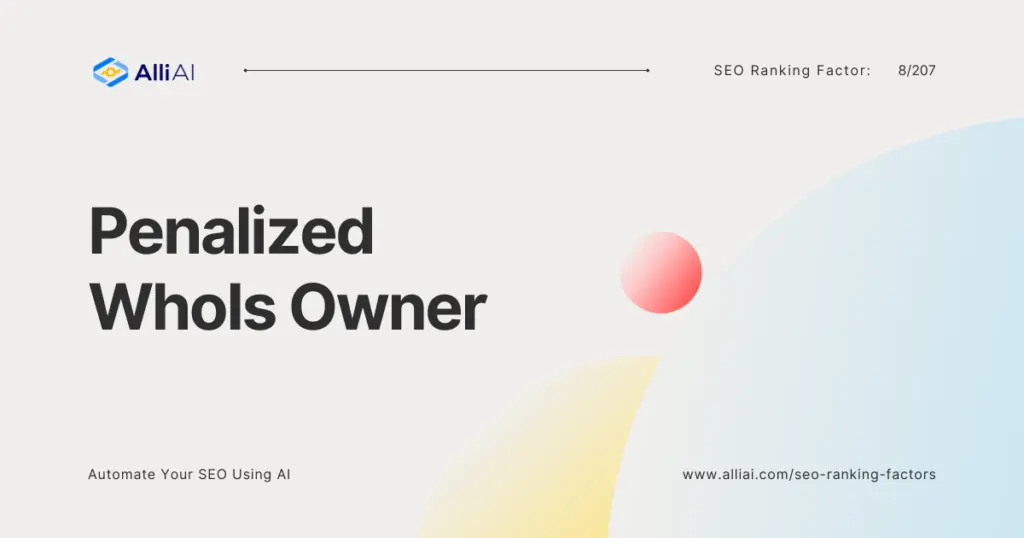What is Penalized WhoIs Owner?
A “Penalized WhoIs Owner” is an entity or individual associated with a domain registration that has been flagged or penalized by search engines due to violations of their Webmaster Guidelines. This could be due to a variety of reasons, including spammy content, participation in link schemes, or engaging in deceptive practices.
When a website violates these guidelines, search engines like Google may penalize the site, which can result in a drop in rankings or even removal from search engine result pages (SERPs). The penalty can sometimes extend to the WhoIs owner of the domain, especially if that owner has multiple domains that violate guidelines. This means that other websites associated with the same WhoIs owner might also be scrutinized or penalized due to the shared ownership, even if those sites have not directly violated any guidelines.
Imagine you’re the owner of several restaurants in a city. If health inspectors find violations in one of your establishments, it might prompt them to inspect your other restaurants more closely, assuming the management practices might be similar across your businesses. If they find repeated violations, you, as the owner, might gain a reputation that leads to closer scrutiny or penalties across all your establishments, regardless of each one’s individual compliance.
Why is Penalized WhoIs Owner important in SEO?
Identifying a penalized WhoIs owner is crucial in SEO because it highlights the importance of maintaining clean, guideline-compliant practices across all owned websites. Knowing that penalties can extend beyond a single site to affect all sites registered under a particular owner underscores the need for consistent, white-hat SEO strategies across one’s digital portfolio.
How Penalized WhoIs Owner affects SEO?
A penalized WhoIs owner can significantly impact SEO efforts in several ways. Once search engines flag a domain owner for non-compliance, any current or future domains associated with this owner might be deemed untrustworthy. This suspicion can lead to lower rankings or a longer vetting process for indexing. Moreover, if a search engine imposes a manual action penalty on one of the domains, it may closely monitor other domains owned by the same entity, affecting their ability to rank well.
According to a study by Moz, domains with a history of penalties see a marked decrease in their ability to rank well in search results. Another report by Search Engine Journal suggests that recovery from a penalty, especially if it affects multiple owned sites, can be arduous and time-consuming, often requiring a thorough audit and clean-up of backlinks and content across all affected sites.
FAQ
What are the steps to recover from a penalty due to a penalized WhoIs owner?
Recovering from such a penalty involves identifying and rectifying the violations on all affected domains, submitting reconsideration requests to search engines, and in some cases, distancing your other domains from the penalized entity through changes in ownership details or by proving the independence of the sites’ operations.
How can one prevent penalties associated with WhoIs ownership?
Preventative measures include rigorously following search engine guidelines, regularly auditing your websites for compliance, diversifying the registration details for multiple domains to avoid centralized penalties, and using reputable SEO practices across all your websites.
Can changing WhoIs information help in avoiding or lifting penalties?
While changing WhoIs information can sometimes be seen as an effort to evade penalties, search engines are sophisticated enough to track changes. The best approach is to address the root causes of the penalties rather than attempting to evade them through information changes.
Conclusion
The concept of a penalized WhoIs owner underscores the interconnected nature of domain ownership and the far-reaching implications of SEO practices across multiple websites. It serves as a reminder for webmasters and SEO professionals to adhere strictly to search engine guidelines and maintain high-quality, compliant content across all digital assets. Recovering from such penalties requires a focused, transparent effort to rectify the issues and communicate effectively with search engines. Ultimately, a proactive, ethical approach to SEO is the best defense against becoming a penalized WhoIs owner.






